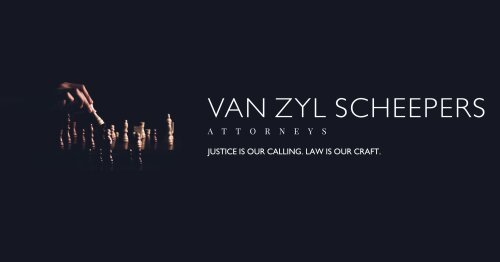Best Pension Lawyers in Stellenbosch
Share your needs with us, get contacted by law firms.
Free. Takes 2 min.
List of the best lawyers in Stellenbosch, South Africa
About Pension Law in Stellenbosch, South Africa
Pension law in Stellenbosch, South Africa, is governed by a combination of national legislation, local regulations, and specific pension scheme rules. South Africa's pension system broadly consists of a mix of public, private, and occupational pension schemes designed to provide financial security during retirement. Stellenbosch, as part of the Western Cape province, adheres to these national norms while accommodating various public and private frameworks tailored to regional needs. Understanding the specifics is crucial for ensuring compliance and maximizing benefits.
Why You May Need a Lawyer
There are several situations where individuals in Stellenbosch might seek legal advice regarding pensions. These include disputes over pension entitlement, issues relating to pension fund administration, misunderstandings regarding the payout process, and questions about how changes in legislation might affect existing pension arrangements. Additionally, employers may require guidance on setting up retirement plans or handling pension-related disputes with employees. A lawyer specializing in pension law can help navigate these complex issues, ensuring rights are protected and obligations are met.
Local Laws Overview
In Stellenbosch, pension laws are primarily guided by national legislation such as the Pension Funds Act and the Income Tax Act. Key aspects of these laws include the regulation of pension fund management, tax treatment of contributions and withdrawals, and protections for beneficiaries. Additionally, the Financial Sector Conduct Authority (FSCA) oversees compliance with these laws, ensuring that pension funds operate in the best interests of their members. Understanding these regulations can help both individuals and employers make informed decisions about retirement planning and compliance.
Frequently Asked Questions
What is the retirement age for accessing pension benefits in South Africa?
The standard retirement age is typically 60 to 65 years, but this can vary depending on the pension scheme rules.
How are pensions taxed in South Africa?
Pensions are subject to income tax, but there are allowances and thresholds that can affect how much tax is paid on benefits received.
Can foreigners access South Africa's pension system?
Foreigners working in South Africa may participate in private and occupational pension schemes, provided they meet the eligibility criteria set by fund regulations.
What happens to a pension fund when a member passes away?
The pension fund's rules will dictate the distribution of benefits, often favoring nominated beneficiaries or dependents.
Are pension contributions mandatory for employers?
While not universally mandatory, many employers offer pension schemes as part of employment contracts, and certain sectors may have specific requirements.
How can I transfer my pension to another fund?
Pension transfers are possible, but the process can be complex and may involve fees or tax implications. Professional advice is recommended.
What should I do if there is a dispute with my pension fund?
First, contact your fund administrator for clarification. If unresolved, seeking legal assistance or approaching the FSCA may be necessary.
What are my rights as a pension fund member?
Members have rights to information, fair treatment, and, in some cases, participation in fund governance. Policy documents outline specific rights.
How are pension funds regulated in South Africa?
The FSCA regulates pension funds to ensure they are administered in the best interests of members, enforcing compliance with applicable laws.
Can I access my pension funds early?
Early access is restricted and typically only possible in cases of severe financial hardship, with specific conditions and penalties applicable.
Additional Resources
For more information on pensions in Stellenbosch, individuals can consult the Financial Sector Conduct Authority (FSCA), which provides regulatory oversight and guidance. Additionally, the South African Revenue Service (SARS) offers details on the tax implications of pensions. Professional organizations such as the Institute of Retirement Funds Africa may also provide valuable insights and assistance.
Next Steps
If you require legal assistance with a pension matter in Stellenbosch, consider consulting with a lawyer specializing in pension law. Start by gathering all relevant documentation about your pension arrangement and any correspondence related to your query or concern. Seeking professional advice can clarify your situation and guide you towards a resolution or an informed decision.
Lawzana helps you find the best lawyers and law firms in Stellenbosch through a curated and pre-screened list of qualified legal professionals. Our platform offers rankings and detailed profiles of attorneys and law firms, allowing you to compare based on practice areas, including Pension, experience, and client feedback.
Each profile includes a description of the firm's areas of practice, client reviews, team members and partners, year of establishment, spoken languages, office locations, contact information, social media presence, and any published articles or resources. Most firms on our platform speak English and are experienced in both local and international legal matters.
Get a quote from top-rated law firms in Stellenbosch, South Africa — quickly, securely, and without unnecessary hassle.
Disclaimer:
The information provided on this page is for general informational purposes only and does not constitute legal advice. While we strive to ensure the accuracy and relevance of the content, legal information may change over time, and interpretations of the law can vary. You should always consult with a qualified legal professional for advice specific to your situation.
We disclaim all liability for actions taken or not taken based on the content of this page. If you believe any information is incorrect or outdated, please contact us, and we will review and update it where appropriate.











